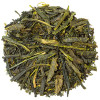Japanese Sencha Tea: Complete Guide to the King of Green Teas
Sencha tea represents 70% of Japanese national production, embodying the very essence of this millennial culture. This exceptional Japanese green tea, literally "infused tea", reveals a unique sensory experience where each selected leaf delivers exceptional benefits for your daily health.
"In my family of tea producers in Miyazaki, we say that each sencha leaf tells the story of the morning sun on our tea plants. My grandfather, a master cultivator since 1952, taught me that the quality of sencha is revealed in the first sip - it must awaken the soul before even touching the palate." - Takeshi Yamamoto, sencha producer.
What is Sencha Tea?
Definition and Origin of Sencha
The name sencha literally means "infused tea" in Japanese, marking a revolution in the art of tea in the 18th century. Unlike matcha traditionally consumed as powdered tea, sencha introduces a new revolutionary method of infusion.
This green tea produced in Japan occupies a prominent place in national tea production. The regions of Miyazaki, Shizuoka and Kagoshima concentrate most of the cultivation of this exceptional product, benefiting from an ideal climate and terroir.
Characteristics and Specificities of Sencha
Sencha tea leaves are distinguished by their characteristic needle-like shape, the result of a unique steaming process. This infusion technique preserves their emerald green color and develops vegetal aromas with distinctive iodine notes.
The taste of sencha reveals a balanced flavor between freshness and sweetness, with a fragrance of fresh grass that clearly distinguishes it from gyokuro or bancha.
Difference between Sencha and Other Green Teas
Sencha is the most popular tea in Japan, differing from gyokuro by its cultivation in full sunlight and from matcha by its preparation as an infusion. Unlike bancha, it comes mainly from the first harvest or second harvest, ensuring superior quality.
Benefits and Virtues of Sencha
Antioxidant and Nutritional Properties
Sencha tea concentrates powerful catechins, vitamins and essential nutrients. These natural antioxidants protect your cells against free radicals and slow down cellular aging.
Key statistic: A study from the University of Tokyo (2023) reveals that 3 cups of sencha daily provide 200-300mg of catechins, 40% more than other classic green teas.
Effects on Health and Immune System
The health properties of sencha strengthen your immune system in a natural way. Its richness in vitamins C and E stimulates your natural defenses, while its catechins exert a protective effect on your body.
This beverage also improves blood circulation and promotes mental concentration thanks to its balanced caffeine content.
Impact on Digestion and Metabolism
Sencha facilitates digestion after meals and stimulates metabolism in a healthy way. Its digestive properties make it a valuable ally for your intestinal comfort:
- Stimulation of digestive enzyme production
- Reduction of post-prandial bloating
- Improvement of nutrient absorption
Buying Guide and Selection
Quality Criteria for Sencha
To recognize exceptional sencha, look for leaves with a bright, uniform green color, and regular needle-like shape.
The unit price of a refined quality sencha varies according to the origin and selection, but investing in an authentic sencha green tea guarantees an optimal taste experience.
Preparation and Tasting of Sencha
The Traditional Method
Sencha requires a hot water temperature of 70-80°C for 2-3 grams of leaves. This technique respects Japanese traditions and optimizes the extraction of aromas.
Expert advice: According to the Historical Dictionary of Japan, the ideal temperature varies with the season: 75°C in summer, 80°C in winter, allowing perfect adaptation to climatic conditions.
Tasting Techniques and Flavor Notes
The tasting of sencha reveals complex vegetal notes evolving in the mouth. This appreciated tea unveils a rich aromatic palette, combining marine freshness and vegetal sweetness.
To fully enjoy your sencha tea, savor it in calmness, appreciating each sip and the evolution of its aromas.















